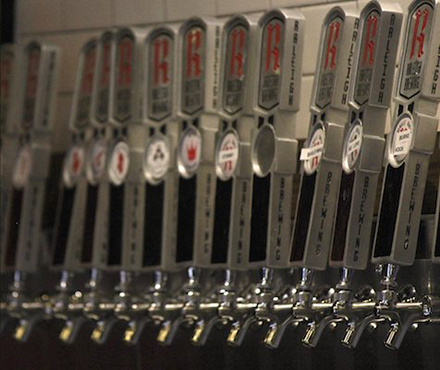Publisher's note: This post appears here courtesy of the Carolina Journal, and written by John Trump, managing editor.
Beer taps at Raleigh Brewing Co. (CJ photo by Kari Travis)
Much of the media coverage of the continuing government shutdown has focused on stories of federal workers who aren't getting paid. Stories about irregular inspections of our food and longer, slower lines at airports.
Expect more of the same.
But some things we enjoy - workers in the private and federal sectors alike - and things that make our lives better are affected, too. Things such as zoos, museums, and national parks.
Things such as beer.
The shutdown is affecting craft brewers, of which North Carolina has many. The shutdown, as the
Associated Press reported, has put a hold on new releases, prevented new breweries from opening, and stopped shipments of some beer across state lines.
The partial shutdown halted operations at the federal agency that regulates alcohol production and distribution, the AP says, meaning government employees can't issue the necessary permits.
The shutdown, which began Dec. 22, hurts craft brewers who offer wider varieties of beer and seasonal selections - in smaller batches. The biggest brewers are largely unaffected because they already have government approval for their top national brands.
"I've been joking with people that if you're going to want a new beer coming out pretty soon, you're going to have to drink your brother-in-law's home brew," said Russ Klisch, founder and president of Lakefront Brewery in Milwaukee, told the AP.
At Lakefront, the release of a new beer has been postponed because the Alcohol and Tobacco Tax and Trade Bureau is not open to approve labels for the bottles and cans. The brewery can sell beer in Wisconsin, but sales in other states require federally approved labels.
The TTB holds holds federal regulatory control, including tax oversight, over alcohol and tobacco.
The bureau, while still performing some functions, is effectively closed.
"TTB," the site says, "will suspend all non-excepted TTB operations, and no personnel will be available to respond to any inquiries, including emails, telephone calls, facsimiles, or other communications."
It is, however, accepting payments and returns for excise taxes.
This week, The Hill reported, a Washington, D.C., brewery sued the acting U.S. attorney general over its inability to sell labeled beer during the shutdown.
In the lawsuit, the brewer, Atlas Brew Works, argues the shutdown has affected its ability to sell labeled beer, and this represents a violation of the First Amendment.
"The brewer says in the lawsuit that the [TTB] approved labels for cans of a beer called The Precious One. But labels for kegs of the beverage did not receive an approval before the shutdown and shipping them outside of the D.C. area would violate federal law."
We're not taking sides or assigning blame. But, the reality is, the government is heavily invested in regulating alcohol, and the details of the rules, codes, and laws are, at best, intricate. At worst, they're twisted and convoluted.
North Carolina has some 300 breweries and brew pubs, the N.C. Craft Brewers Guild says. So far, the state's brewers have so far rumbled just a little about the consequences of the federal shutdown. Expect them to get louder as the shutdown drags on.
"Anybody distributing beers outside North Carolina is going to be affected," says Kristie Nystedt, president and CEO of Raleigh Brewing Co.
Sister companies Atlantic Brew Supply and ABC Commercial provide supplies to home brewers and brewing equipment to brewers, with clients throughout the U.S. and beyond. Nystedt said ABS is moving equipment and helping brewers to get up and running. But, without TTB approval, upstart brewers can't hit "go."
Nystedt's company, she says, is - and has been - dealing with crushing tariffs on steel.
"That has the largest impact on our business," she said of the tariffs. "Things will change, for sure ... but hopefully they'll change sooner rather than later."
























